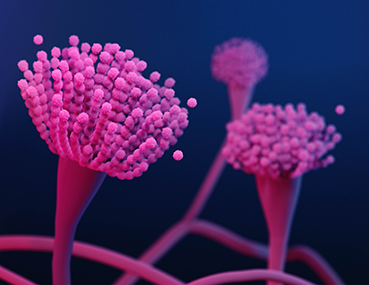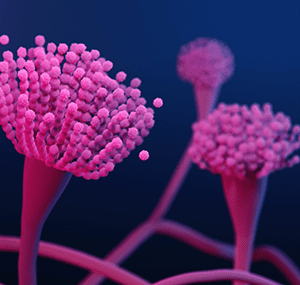Aspergillus RT-PCR
350,00 zł
Metoda: RT-PCR
Termin realizacji : 2 – 5 dni roboczych
Materiał badany: plwocina lub inny materiał uzgodniony z laboratorium
Opis
Test polega na identyfikacji i różnicowaniu DNA Aspergillus w badanym materiale. Różnicowanie obejmuje gatunki A. fumigatus oraz A. flavus, (pozostałe wykryte gatunki oznaczone są jako Aspergillus spp).
Może Cię zainteresować również badanie Aspergillus RT-PCR + lekooporność.
Etapy badania molekularnego:
- izolacja materiału genetycznego (DNA) z badanego materiału
- powielenie sekwencji DNA charakterystycznych dla poszukiwanego gatunku patogenu (reakcja RT-PCR)
- analiza wyniku
Co to jest aspergiloza?
Aspergiloza to choroba zakaźna wywoływana przez Aspergillus, pospolitą pleśń (rodzaj grzyba), która żyje w pomieszczeniach i na zewnątrz. Większość ludzi codziennie wdycha zarodniki Aspergillus bez zachorowania. Jednak osoby z osłabionym układem odpornościowym lub chorobami płuc są bardziej narażone na problemy zdrowotne z powodu Aspergillus. Istnieją różne rodzaje aspergilozy. Niektóre typy są łagodne, ale niektóre z nich są bardzo poważne.
Rodzaje aspergilozy
Alergiczna aspergiloza oskrzelowo-płucna (ABPA): Występuje, gdy Aspergillus powoduje stan zapalny w płucach i objawy alergii, takie jak kaszel i świszczący oddech, ale nie powoduje infekcji.
Alergiczne zapalenie zatok wywołane przez Aspergillus: Występuje, gdy Aspergillus powoduje zapalenie zatok i objawy infekcji zatok (drenaż, duszność, ból głowy), ale nie powoduje infekcji.
Azol-odporny Aspergillus fumigatus: Występuje, gdy jeden gatunek Aspergillus, A. fumigatus, staje się odporny na niektóre leki stosowane w jego leczeniu. Pacjenci z opornymi infekcjami mogą nie ulec poprawie po leczeniu.
Aspergilloma: Występuje, gdy kulka Aspergillus rośnie w płucach lub zatokach, ale zwykle nie rozprzestrzenia się na inne części ciała.
Przewlekła aspergiloza płucna: Występuje, gdy infekcja Aspergillus powoduje ubytki w płucach i może być stanem długotrwałym (3 miesiące lub dłużej). W płucach może również znajdować się jedna lub więcej kulek grzybiczych (aspergilloma).
Inwazyjna aspergiloza: występuje, gdy Aspergillus powoduje poważną infekcję i zwykle dotyka osoby z osłabionym układem odpornościowym, takie jak osoby po przeszczepie narządu lub przeszczepie komórek macierzystych. Inwazyjna aspergiloza najczęściej atakuje płuca, ale może również rozprzestrzeniać się na inne części ciała.
Aspergiloza skórna: Występuje, gdy Aspergillus dostaje się do organizmu przez pęknięcie skóry (na przykład po operacji lub ranie oparzeniowej) i powoduje infekcję, zwykle u osób z osłabionym układem odpornościowym. Aspergiloza skórna może również wystąpić, jeśli inwazyjna aspergiloza rozprzestrzeni się na skórę z innego miejsca w ciele, na przykład z płuc.
Objawy aspergilozy
Objawy alergicznej aspergilozy oskrzelowo-płucnej (ABPA) są podobne do objawów astmy, w tym:
- Świszczący oddech
- Duszność
- Kaszel
- Gorączka (w rzadkich przypadkach)
Objawy alergicznego zapalenia zatok Aspergillus:
- Duszności
- Katar
- Ból głowy
- Zmniejszona zdolność do węchu
Objawy aspergilloma:
- Kaszel
- Odkrztuszanie krwi
- Duszność
Objawy przewlekłej aspergilozy płucnej:
- Odchudzanie
- Kaszel
- Odkrztuszanie krwi
- Zmęczenie
- Duszność
Gorączka jest częstym objawem inwazyjnej aspergilozy.
Inwazyjna aspergiloza zwykle występuje u osób, które są już chore na inne schorzenia, więc może być trudno ustalić, które objawy są związane z infekcją Aspergillus. Jednak objawy inwazyjnej aspergilozy w płucach obejmują:
- Gorączka
- Ból w klatce piersiowej
- Kaszel
- Odkrztuszanie krwi
- Duszność
- Inne objawy mogą się rozwinąć, jeśli infekcja rozprzestrzenia się z płuc na inne części ciała.
Skontaktuj się z lekarzem, jeśli masz objawy, które Twoim zdaniem są związane z jakąkolwiek formą aspergilozy.
Rodzaje Aspergillus
Istnieje około 180 gatunków Aspergillus, ale wiadomo, że mniej niż 40 z nich powoduje infekcje u ludzi. Aspergillus fumigatus jest najczęstszą przyczyną ludzkich zakażeń Aspergillus. Inne popularne gatunki to A. flavus, A. terreus i A. niger.
———————————————————————–
![]()
tested material: sputum or other material agreed with the laboratory
Identification and differentiation of Aspergillus DNA in the test material. The differentiation includes the species A. fumigatus and A. flavus, (the other species detected are designated Aspergillus spp).
Stages of molecular research:
- isolation of genetic material (DNA) from the tested material
- duplication of DNA sequences characteristic of the pathogen species sought (RT-PCR)
- result analysis
What is aspergillosis?
Aspergillosis is a disease caused by Aspergillus, a common mold (a type of fungus) that lives indoors and outdoors. Most people inhale Aspergillus spores daily without getting sick. However, people with a weakened immune system or lung disease are more likely to develop health problems due to Aspergillus. There are different types of aspergillosis. Some types are mild, but some are very serious.
Types of aspergillosis
Allergic bronchopulmonary aspergillosis (ABPA): Occurs when Aspergillus causes inflammation in the lungs and allergy symptoms such as coughing and wheezing, but does not cause infection.
Allergic sinusitis caused by Aspergillus: Occurs when Aspergillus causes sinusitis and symptoms of sinus infection (drainage, shortness of breath, headache) but does not cause infection.
Azole-resistant Aspergillus fumigatus: It occurs when one species of Aspergillus, A. fumigatus, becomes resistant to certain drugs used to treat it. Patients with resistant infections may not improve with treatment.
Aspergilloma: Occurs when an Aspergillus ball grows in the lungs or sinuses, but does not usually spread to other parts of the body.
Chronic pulmonary aspergillosis: Occurs when an Aspergillus infection causes cavities in the lungs and can be a long-term condition (3 months or more). There may also be one or more fungal balls (aspergilloma) in the lungs.
Invasive aspergillosis: occurs when Aspergillus causes a serious infection and usually affects people with weakened immune systems, such as those who have had an organ or stem cell transplant. Invasive aspergillosis most commonly affects the lungs, but it can also spread to other parts of the body.
Cutaneous aspergillosis: Occurs when Aspergillus enters the body through a break in the skin (after surgery or a burn wound, for example) and causes an infection, usually in people with a weakened immune system. Cutaneous aspergillosis can also occur if invasive aspergillosis spreads to the skin from elsewhere in the body, such as the lungs.
Aspergillosis symptoms
The symptoms of allergic bronchopulmonary aspergillosis (ABPA) are similar to the symptoms of asthma, including:
- Wheezing
- Dyspnoea
- Cough
- Fever (in rare cases)
Symptoms of allergic Aspergillus sinusitis:
- Shortness of breath
- Runny nose
- Headache
- Reduced ability to smell
Symptoms of aspergilloma:
- Cough
- Coughing up blood
- Dyspnoea
Symptoms of chronic pulmonary aspergillosis:
- Slimming
- Cough
- Coughing up blood
- Tiredness
- Dyspnoea
Fever is a common symptom of invasive aspergillosis.
Invasive aspergillosis usually occurs in people who are already suffering from other diseases, so it can be difficult to determine which symptoms are related to Aspergillus infection. However, symptoms of invasive aspergillosis in the lungs include:
- Fever
- Pain in the chest
- Cough
- Coughing up blood
- Dyspnoea
- Other symptoms may develop if the infection spreads from the lungs to other parts of the body.
Contact your doctor if you have symptoms that you think are related to any form of aspergillosis.
Types of Aspergillus
There are about 180 species of Aspergillus, but less than 40 of them are known to cause infections in humans. Aspergillus fumigatus is the most common cause of human Aspergillus infections. Other common species include A. flavus, A. terreus and A. niger.




